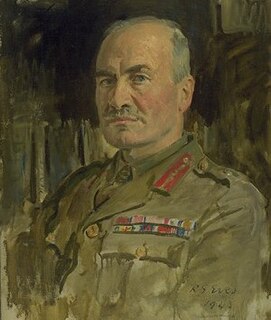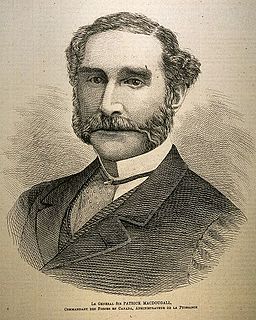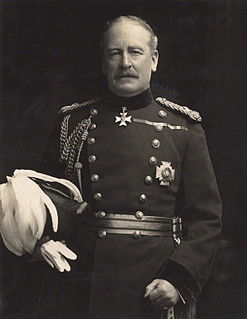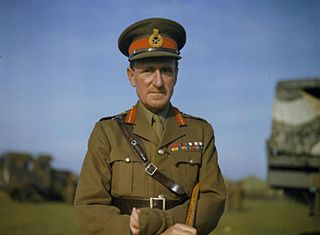 W
WGeneral Sir Ronald Forbes Adam, 2nd Baronet, was a senior British Army officer. He had an important influence on the conduct of the British Army during the Second World War as a result of his long tenure as Adjutant-General, responsible for the army's organisation and personnel, from June 1941 until the end of the war, and as a close confidant of Field Marshal Sir Alan Brooke, the Chief of the Imperial General Staff (CIGS), the professional head of the British Army.
 W
WGeneral Sir Archibald Alison, 2nd Baronet was a Scottish soldier who achieved high office in the British Army in the 1880s. He was a descendant of the Alison family presented by Francis Galton in Hereditary Genius (1869) as an example of genius inherited over several generations.
 W
WLieutenant General Sir Warren Hastings Anderson was Quartermaster-General to the Forces.
 W
WGeneral Sir (Charles) Clement Armitage, was a British Army officer who commanded 1st Infantry Division shortly before World War II.
 W
WGeneral Sir William Gerald Hugh Beach, was a British Army officer who, in retirement, researched and advised on defence policy, arms control and disarmament, with an interest in promoting concerns about ethical issues of peace and war.
 W
WGeneral Sir Mervyn Andrew Haldane Butler, was a British Army officer who served as Commander-in-Chief Strategic Command.
 W
WMajor-General Sir Cornelius Francis Clery was a British Army officer who took part in the Anglo-Zulu War and later commanded the 2nd Division during the Second Boer War.
 W
WGeneral Sir Alan Gordon Cunningham, was a senior officer of the British Army noted for his victories over Italian forces in the East African Campaign during the Second World War. Later he served as the seventh and last High Commissioner of Palestine. He was the younger brother of Admiral of the Fleet Lord Cunningham of Hyndhope.
 W
WField Marshal Sir John Greer Dill, was a senior British Army officer with service in both the First World War and the Second World War. From May 1940 to December 1941 he was the Chief of the Imperial General Staff (CIGS), the professional head of the British Army, and subsequently in Washington, D.C., as Chief of the British Joint Staff Mission and then Senior British Representative on the Combined Chiefs of Staff (CCS), played a significant role during the Second World War in the formation of the "Special Relationship" between the United Kingdom and the United States.
 W
WField Marshal John Standish Surtees Prendergast Vereker, 6th Viscount Gort, was a senior British Army officer. As a young officer during the First World War he was decorated with the Victoria Cross for his actions during the Battle of the Canal du Nord. During the 1930s he served as Chief of the Imperial General Staff. He is best known for commanding the British Expeditionary Force that was sent to France in the first year of the Second World War, only to be evacuated from Dunkirk the following year. Gort later served as Governor of Gibraltar and Malta, and High Commissioner for Palestine and Transjordan.
 W
WMajor General Philip George Saxon Gregson-Ellis CB OBE was a senior British Army officer who saw active service during both the First World War and the Second World War, where he commanded the 5th Infantry Division during the Italian Campaign in 1944.
 W
WMajor General Sir Charles William Gwynn, KCB, CMG, DSO, FRGS was an Irish born British Army officer, geographer, explorer and author of works on military history and theory.
 W
WLieutenant General Sir Edward Bruce Hamley was a British general and military writer and a Conservative politician who sat in the House of Commons from 1885 to 1892.
 W
WGeneral Sir Charles Henry Pepys Harington, was an officer in the British Army. He served in the British Expeditionary Force and in Normandy during World War II. He was later Commander-in-Chief of the three-service Middle East Command from 1963 to 1965, based at Aden. He ended his military career as Chief of Personnel and Logistics at the UK Ministry of Defence from 1968 to 1971.
 W
WGeneral Sir Reginald Hackett Hewetson, was a senior British Army officer and a former Adjutant-General to the Forces.
 W
WGeneral Sir Henry John Thoroton Hildyard was a British Army officer who saw active service in the Anglo-Egyptian War of 1882 and the Second Boer War. He was General Officer Commanding-in-Chief, South Africa, from 1905 to 1908.
 W
WField Marshal Sir Richard Amyatt Hull, was a senior British Army officer. He was the last Chief of the Imperial General Staff (1961–64) and the first Chief of the General Staff (1964–65), and, as such, the professional head of the British Army. He later became Chief of the Defence Staff (1965–67), the professional head of the entire British Armed Forces. He served with distinction during the Second World War, fighting from 1942 to 1945 in North Africa, Italy and Western Europe, became the youngest divisional commander in the British Army, and later advised the British government on the response to the Indonesia–Malaysia confrontation.
 W
WField Marshal William Edmund Ironside, 1st Baron Ironside, was a senior officer of the British Army, who served as Chief of the Imperial General Staff during the first year of the Second World War.
 W
WGeneral Sir Charles Phibbs Jones was a British Army general who reached high office in the 1950s.
 W
WLieutenant-General Sir Launcelot Edward Kiggell, was a British Army officer who was Chief of General Staff for the British Armies in France under Sir Douglas Haig from late 1915 to 1918.
 W
WGeneral Sir Gerald William Lathbury, was a senior British Army officer who fought during the Second World War, serving with distinction with the British Army's airborne forces, commanding the 1st Parachute Brigade in Sicily, Italy and Holland. He later became Governor of Gibraltar from 1965 to 1969.
 W
WGeneral Sir Patrick Leonard MacDougall, was a British Army officer who became Commander of the British Troops in Canada.
 W
WLieutenant General Sir Herbert Scott Gould Miles, was a senior British Army officer. He was Quartermaster-General to the Forces from 1908 to 1912, and Governor of Gibraltar from 1913 until 1918 during the First World War.
 W
WGeneral Sir Bernard Charles Tolver Paget, was a senior British Army officer during the Second World War. He commanded the 21st Army Group from June to December 1943 and was Commander-in-Chief (C-in-C) Middle East Command from January 1944 to October 1946. He was the senior serving general in the British Army.
 W
WGeneral Sir Joseph Howard Nigel Poett, was a British Army officer who commanded the 5th Parachute Brigade during the Second World War.
 W
WGeneral Henry Seymour Rawlinson, 1st Baron Rawlinson,, known as Sir Henry Rawlinson, 2nd Baronet between 1895 and 1919, was a senior British Army officer in the First World War who commanded the Fourth Army of the British Expeditionary Force at the battles of the Somme (1916) and Amiens (1918) as well as the breaking of the Hindenburg Line (1918). He commanded the Indian Army from 1920 to 1925.
 W
WField Marshal Sir William Robert Robertson, 1st Baronet, was a British Army officer who served as Chief of the Imperial General Staff (CIGS) – the professional head of the British Army – from 1916 to 1918 during the First World War. As CIGS he was committed to a Western Front strategy focusing on Germany and was against what he saw as peripheral operations on other fronts. While CIGS, Robertson had increasingly poor relations with David Lloyd George, Secretary of State for War and then Prime Minister, and threatened resignation at Lloyd George's attempt to subordinate the British forces to the French Commander-in-Chief, Robert Nivelle. In 1917 Robertson supported the continuation of the Third Battle of Ypres, at odds with Lloyd George's view that Britain's war effort ought to be focused on the other theatres until the arrival of sufficient US troops on the Western Front.
 W
WGeneral Sir Hugh Michael Rose,, often known as Mike Rose, is a retired British Army general. As well as Special Air Service Regiment commanding officer, he was Commander UNPROFOR Bosnia in 1994 during the Yugoslav Wars.
 W
WField Marshal Sir John Wilfred Stanier, was a senior British Army officer who was Chief of the General Staff from 1982 to 1985. He was the first person after the Second World War to become the professional head of the British Army without having seen active service in that war or any subsequent campaign.
 W
WGeneral Sir Montagu George North Stopford was a senior British Army officer who fought during both World War I and World War II. The latter he served in with distinction, commanding XXXIII Indian Corps in the Far East, where he served under Field Marshal Sir William Slim, and played a significant role in the Burma Campaign, specifically during the Battle of Kohima in mid-1944.
 W
WLieutenant General Sir Christopher Brooke Quentin Wallace, was a British Army officer and military historian.
 W
WGeneral Sir Alfred Dudley Ward,, commonly known as Sir Dudley Ward, was a senior British Army officer who saw distinguished active service during the Second World War and later became Governor of Gibraltar. Serving as an ordinary soldier for three years before being sent for officer training in 1926, slow peacetime career progression saw Ward achieving the rank of captain only in 1937. However, the Second World War, which began just two years later, allowed him to demonstrate his high ability as both a staff officer and a commander of troops in the field. Receiving command of the 4th Infantry Division at the unusually young age of 39 years and 3 months, he led the division in Italy and Greece from 1944 to 1945. After the war ended in 1945, Ward went on to hold several staff and field appointments at the highest levels, including Deputy Chief of the Imperial General Staff and Commander-in-Chief of the British Army of the Rhine, retiring as a full general in 1965.
 W
WField Marshal Sir Henry Hughes Wilson, 1st Baronet, was one of the most senior British Army staff officers of the First World War and was briefly an Irish unionist politician.
 W
WMajor-General Douglas Neil Wimberley, was a British Army officer who, during the Second World War, commanded the 51st (Highland) Division for two years, from 1941 to 1943, notably at the Second Battle of El Alamein, before leading it across North Africa and in the Allied campaign in Sicily.